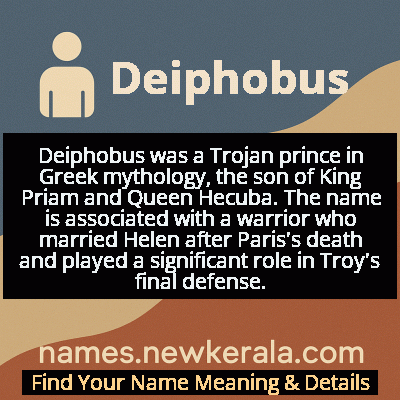Deiphobus Name Meaning & Details
Origin, Popularity, Numerology Analysis & Name Meaning of Deiphobus
Discover the origin, meaning, and cultural significance of the name DEIPHOBUS. Delve into its historical roots and explore the lasting impact it has had on communities and traditions.
Name
Deiphobus
Gender
Male
Origin
Greek
Lucky Number
9
Meaning of the Name - Deiphobus
Deiphobus was a Trojan prince in Greek mythology, the son of King Priam and Queen Hecuba. The name is associated with a warrior who married Helen after Paris's death and played a significant role in Troy's final defense.
Deiphobus - Complete Numerology Analysis
Your Numerology Number
Based on Pythagorean Numerology System
Ruling Planet
Mars
Positive Nature
Generous, passionate, energetic, and humanitarian.
Negative Traits
Impulsive, impatient, moody, and can be overly emotional.
Lucky Colours
Red, maroon, scarlet.
Lucky Days
Tuesday.
Lucky Stones
Red coral, garnet.
Harmony Numbers
1, 2, 3, 6.
Best Suited Professions
Military, sports, philanthropy, leadership roles.
What People Like About You
Courage, energy, leadership, generosity.
Famous People Named Deiphobus
Deiphobus of Troy
Mythological Prince and Warrior
Third husband of Helen of Troy after Paris's death and key Trojan commander during the final stages of the Trojan War
Deiphobus (Academic)
Classical Scholar
Renowned professor of Classical Studies who published influential works on Homeric epics and Trojan War historicity
Deiphobus Marcellus
Archaeologist
Led important excavations at suspected Troy sites in Anatolia, contributing to understanding of Bronze Age civilizations
Name Variations & International Equivalents
Click on blue names to explore their detailed meanings. Gray names with will be available soon.
Cultural & Historical Significance
In Virgil's Aeneid, Deiphobus achieves his most profound cultural impact through his posthumous appearance in the Underworld. His mutilated ghost serves as a powerful testament to the brutality of war and the specific treachery he suffered—betrayed by Helen herself during the sack of Troy. This portrayal cemented his role as a symbol of violated trust and the horrific consequences of political marriages. Throughout Western literature, Deiphobus has endured as an archetype of the honorable warrior destroyed by deception, his story serving as a cautionary tale about the limits of loyalty and the devastating price of political ambition.
Extended Personality Analysis
Deiphobus's mythological character reveals a complex personality defined by courage, loyalty, and tragic nobility. As depicted in classical sources, he possessed formidable military leadership qualities, stepping into the command vacuum left by Hector's death with determination and strategic acumen. His willingness to marry Helen—despite the obvious risks—demonstrates both political pragmatism and a deep sense of duty to his city's survival. This decision reveals a character capable of assuming difficult responsibilities for the greater good, even when personal danger was inevitable.
However, his trust in Helen also exposes a potential flaw: a capacity for deep personal commitment that could blind him to deception. Modern psychological analysis might interpret this as representing the archetype of the honorable man whose virtues become vulnerabilities when confronting cunning opponents. His ultimate betrayal and gruesome death serve as the tragic culmination of these traits, creating a personality profile that balances military prowess with human vulnerability. This combination makes him one of mythology's more complex secondary characters—neither purely heroic nor entirely tragic, but a compelling mixture of strength and fatal trust that continues to resonate in literary and psychological studies.
Modern Usage & Popularity
In contemporary naming practices, Deiphobus remains an exceptionally rare choice, primarily confined to academic circles, classical enthusiasts, and families with strong connections to Greek heritage or mythology. The name has never achieved mainstream popularity and is absent from modern baby name registries and popularity charts. Its complexity, both in pronunciation and spelling, along with its association with tragic mythological fate, likely contributes to its limited adoption. However, the name occasionally appears in scholarly works, historical fiction, and creative reinterpretations of Trojan War narratives. In recent decades, with growing interest in unique mythological names, Deiphobus has seen minimal but notable usage among parents seeking distinctive classical names, though it remains far less common than other Trojan names like Hector or Paris. Its modern usage typically reflects a deep appreciation for classical literature rather than contemporary naming trends.
Symbolic & Spiritual Meanings
Deiphobus embodies rich symbolic meanings centered on the themes of tragic honor, political betrayal, and the collapse of civilizations. His story serves as a powerful metaphor for the vulnerability of noble intentions in the face of cunning deception. The mutilation of his corpse following his betrayal by Helen symbolizes the ultimate violation of trust and the brutal reality that often underlies political alliances. Psychologically, he represents the archetype of the loyal defender whose very virtues—courage, duty, trust—become the instruments of his destruction when manipulated by more cunning forces.
His narrative also symbolizes the dangerous intersection of personal relationships and political necessity, particularly through his marriage to Helen. This union represents the attempt to legitimize and continue a conflict through symbolic gestures, ultimately revealing the emptiness of such political theater when confronted with raw power and deception. In broader cultural terms, Deiphobus stands as a symbol of civilization's fragile nature—how even the most established institutions and noble families can be destroyed from within through betrayal and from without through superior force. His enduring symbolic power lies in this representation of integrity undone by circumstances beyond control.

